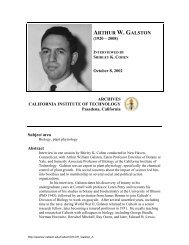Interview with Thomas A. Tombrello - Caltech Oral Histories
Interview with Thomas A. Tombrello - Caltech Oral Histories
Interview with Thomas A. Tombrello - Caltech Oral Histories
Create successful ePaper yourself
Turn your PDF publications into a flip-book with our unique Google optimized e-Paper software.
<strong>Tombrello</strong>–123<br />
ASPATURIAN: What I had heard, from somebody who knew somebody who knew somebody<br />
else, was that someone on the committee that decides these things had such terrible feelings<br />
against David Gross that he said, “David Gross will never win the Nobel Prize as long as I am<br />
alive.” So when the word came down that the three of them—Wilczek, Gross, and Politzer—<br />
were sharing it, I wondered whether this individual had passed on, or whether this was just all<br />
purely apocryphal.<br />
TOMBRELLO: I don’t know. Things like that occur. There was the book written by Diana<br />
Buchwald—Diana Barkan when she wrote the book—about [Walther] Nernst [Walther Nernst<br />
and the Transition to Modern Physical Science (1999)]. Nernst, I believe, ended up winning the<br />
chemistry prize because he was blackballed on the physics prize. So Nernst had two pathways to<br />
success. Whereas Arnold Sommerfeld—he’s the kind of scientist I mentioned earlier who has a<br />
legacy of generations of successful students—had a blackball against him in the community.<br />
And since he was only in physics, it held, and he never won the Nobel Prize. I gather that these<br />
things happen; I don’t know for a fact. One thing I do know has happened in current years—I<br />
will try to not be too specific about it. I think the committees try to do a very, very careful job of<br />
sorting out who should win—who’d done the work and what were the circumstances. They even<br />
commission—I’ve been party to that—various people who might at some future point be<br />
candidates and get them to write a personal history of what they did. I was told explicitly they<br />
were not to be modest. But they were to be accurate. I collected several of those and passed<br />
them on. However, for any given Nobel right now, there are three prizes to be given. Not four.<br />
Not more. Occasionally one person, like Zewail [1999], wins, but never more than three. So if<br />
there are fields where there are legitimate claims for more than three people, there’s an awful lot<br />
of vicious infighting out in the community to push particular candidates forward and to push<br />
other candidates down. This is one of the least attractive things about the current Nobel<br />
situation. I do not believe that extends back to the committees. I think they try to do a very good<br />
job. At least, from what I know about it. Though it’s not to say there aren’t people on there that<br />
say things. I don’t know if anybody said that about David Gross or not, but it is certainly<br />
possible that somebody would take a dislike to someone or for reasons that may actually have<br />
something to do <strong>with</strong> the science. Gross and Wilczek published, basically, a paper that was right<br />
next to the one that David Politzer sent in. So, you know, it was clear it was a horse race to the<br />
http://resolver.caltech.edu/<strong>Caltech</strong>OH:OH_<strong>Tombrello</strong>_T

















